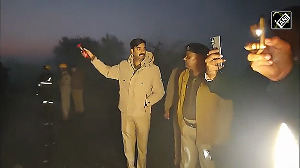When it came to dealing with the media and academia, it has been a roller coaster ride for the National Democratic Alliance, observes Nitin Sethi.

These two years have been about the Bharatiya Janata Party’s civil society versus the others. Entrenching the first in the heart of policy making and atmosphere-building eco-systems has gone hand-in-hand with controlling the dissent of others. The attempt has been to redraw the government’s engagement with civil society and also recast the latter. Think tanks seen linked with the BJP, such as the Vivekananda International Foundation, India Foundation and Council on Energy Environment and Water, have finally arrived in Lutyens’ Delhi. Associations of NRI friends got occasions to showcase their adulation for Prime Minister Modi and get it beamed back to build an atmosphere.
Civil society in India has always had several hues -- think tanks, funding-based non-government organisations, state-supported last-mile service delivery shops, mass-based local groups linked by ideology and individual intellectuals. In these two years, the BJP has given greater bandwidth to two other hues.
One, social media-propelled shrill celebrity endorsers carving their niche in public conversations. Second, the enterprising spiritual-religious endorsers, with their legions of devotees. Of course, the Rashtriya Swayamsevak Sangh’s numerous affiliates have expectedly been rendered central to public conversations as well. At the same time, the others’ civil society, the left-liberal, has suffered a chilling effect. The administration has harped on ‘due process’, while stories on tax and Foreign Contribution Regulation Act notices against them have drawn attention.
An attempt has been made to label public display of dissent against government policy and practice as anti-national. The previous government would do no better at times but was contained by internal arguments. The BJP leadership, on the other hand, still acting as the invader breaching the bastions, has so far found no good reason to be contrite about it.
Academia
If an unfortunate but marquee event was to highlight the two years of the National Democratic Alliance government and how academia fared under it, the tragic suicide of Rohith Vemula would be it. The incident turned into a full-fledged political battle, with the opposition parties coalescing around the emerging Dalit political aspirations, cornering the NDA. The campus ignited and before one knew, the right-winged had stoked up a counter-debate centred at the Left bastion of JawaharlalNehruUniversity, anchored in a jingoistic ‘nationalists versus others’ debate.
As Kanhaiya Kumar and others got targeted with a heavy-handed state action and subsequent attack in the courts, the trench fighting reached its jingoistic worst and the NDA government engaged furiously on it. Venkaiah Naidu, senior minister, pitched the argument for the party: Congress and Left parties were trying “to hijack public discourse and create social unrest and dissension at a time when the government was straining every sinew to make the economy vibrant and bring it out of the deep morass created by the decade-long scam-tainted UPA rule”. A positioning that helped the BJP drive the discourse away from the question of Dalit politics.
The flashpoints between some academic hubs that stereotypically are seen leaning Left and the government became so heated by the end of two years that casual memory would forget the scuffles NDA had, say, at the Film and Television Institute of India or the general abrasive relations between some academicians at the helm in academic institutions and combative Human Resource Development minister Smriti Irani. Or, for that matter, the expected traces of the government mainstreaming RSS-supported ideas and individuals into academics. In this rather heated and rapidly deteriorating milieu, one could tend to forget the return of awards by writers, initially spurred by the murder of rationalist and academic M M Kalburgi, and largely against what these writers termed as intolerance.
But, for the BJP, returning to power after a long period out of government, the friction with segments of academia could also be seen as its wrestling with what Finance Minister Arun Jaitley recently described as one of the last bastions of the Left. He said one couldn’t grudge their remaining presence in the academics, the NGOs and the media. The NDA government has displayed a different and less accommodating tack though.
Media
Once in power, the National Democratic Alliance government quickly sprouted routes for one-way communication with the mainstream media. There was a blast of dazzling announcements, well-orchestrated events and synchronised social media storms. This happened in parallel with a more restrictive direct media engagement with officials and ministers. The government tried to bypass the traditional media and reach the public directly, such as the prime minister’s un-moderated Mann ki Baat.
Media readjusted as its informal access routes dwindled and the controlled, intensive and uniform messaging drive of NDA took root, a sharp contrast to the cacophony of UPA days. The antagonism occasionally flared, such as when V K Singh gave currency to the coinage ‘presstitutes’. An undercurrent of the antagonism prevailed as journalists, especially women, perceived as anti-BJP got viciously trolled on social media. It has been possible to let this remain unchecked by blaming the social behaviour which the anonymity of social media provides anyway.
Labelling a section of critical mainstream journalists as pro or anti-government became a public affair. At times, the ugliness came into the real world as when a Rajdeep Sardesai was heckled at the prime minister’s function or a Siddharth Varadarajan held hostage by Akhil Bharatiya Vidyarthi Parishad cadres at AllahabadUniversity. A greater impunity was at display when journalists got randomly beaten and harassed by hoodlums in Delhi when covering the Kanhaiya case in court.
The debate about intolerance, ‘love jihad’ and other such socially-polarising features of the past two years has further bruised the already nebulous relations between the two pillars of democracy. All through, the government has also enjoyed almost undiluted support from some quarters of the media. To misuse the oft-ridiculed post-riot statement from police authorities, in the two years the relations have been tense but under control.
MARQUEE INCIDENTS AND EVENTS
>> Intelligence reports termed select NGO activities as ‘anti-national’
>> Greenpeace employee offloaded at airport; NGO’s registration suspended after notices and investigations
>> Face-off over Ford Foundation’s status in India
>> Rise of celebrity civil actors and religious-spiritual enterpreneurial leaders
>> V K Singh calls sections of media ‘presstitutes’
>> Journalists covering Kanhaiya Kumar case in Delhi beaten by hoodlums with no consequent legal action
>> Government limits informal access of journalists and simple propagation of information increases
>> Rohith Vemula’s suicide snowballs into a controversy over rightwing capturing a varisity politically
>> Jingoistic anti-nationalism debate at JNU after Rohith Vemula’s death
>> Murder of M M Kalburgi
>> Award wapsi by select academics over intolerance
>> Vicious attacks on select critical journalists on social media, especially women
-- With inputs from Akash Kumar











